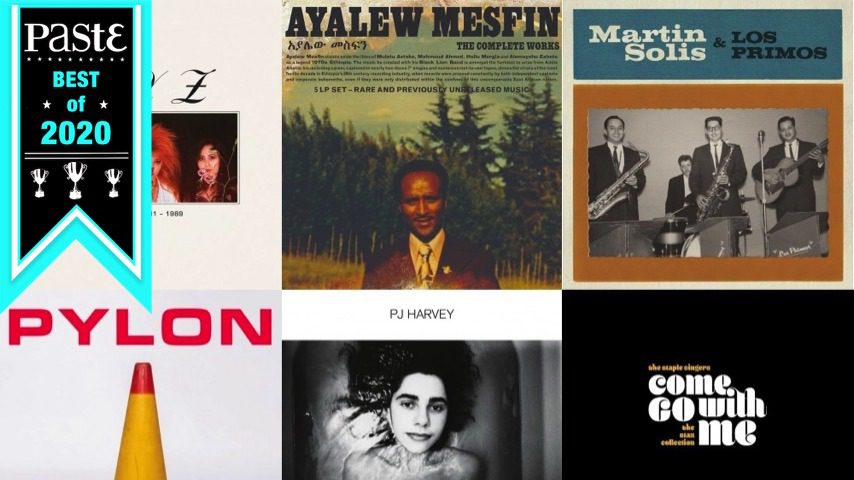Vinyl had another big year in 2020, including the largest sales week of the SoundScan era happening for the seven days after Thanksgiving with over 1.2 million LPs flying off the shelves of retailers. And in a especially welcome development, about half of those transactions took place at indie retailers around the U.S. While many of the records sold this year were new releases from big name pop stars like Harry Styles and Billie Eilish, this resurgence has allowed major labels to dig into their archives for some amazing reissues and let smaller imprints go mining for rare gems. The list below represents a mere sliver of the re-releases that came out in 2020, but it also shows just how the vinyl boom has opened up the market for some far-reaching and thoroughly exciting new pressings of soul/funk classics, deep African grooves and even some rare Japanese post-punk. If you were one of the lucky folks who scored a turntable or a nice gift certificate for a record shop this holiday season, here are some surefire winners to drop the needle on.
African Head Charge: Drumming Is A Language: 1990-2011
(On-U Sound)
According to legend, Adrian Sherwood conceived of his long-running project African Head Charge after hearing Brian Eno talk about—as the title of a 2005 AHC album puts it—a Vision of a Psychedelic Africa. Since the group’s first release in 1981, Sherwood and the many artists who have cycled through the ensemble have made that vision a reality, one bass-heavy tune at a time. On-U Sound, the label that Sherwood has helped run during throughout, is keeping that vision alive this month with the re-release of four AHC albums—Vision, 1990’s Songs of Praise, 1993’s In Pursuit of Shashamane Land and 2011’s Voodoo of the Godsent—as well as a set of outtakes from the Praise and Pursuit sessions. You can pick them up as a deluxe CD set, a vinyl bundle or a la carte.
For anyone looking to dip their toes in and just snag one of these double LP sets (each comes with a lovely poster that includes an interview with AHC co-leader Bonjo Iyabinghi Noah), there’s really no bad place to start. All five records are thick with grooves and Sherwood’s playful production techniques. The emphasis is on rhythm, with ropey basslines provided by legendary players like Wayne Nunes, Doug Wimbish (Living Colour), and Ras Levi, and a heady cluster of percussion instruments. Folks tend to lean toward Praise as being the high water mark for AHC, but I wouldn’t miss out on the fluid churning of Vision or the dub mixes that take up the second side of the outtakes record Churchical Chant of the Iyabinghi.
PJ Harvey: Dry/Dry Demos
(Island/UMe)
The news that Island Records would be reissuing PJ Harvey’s discography on vinyl—along with accompanying LPs of the demos she recorded for each album—was exactly the ray of light music fans needed in this dreary year. And the release schedule is following the timeline of Harvey’s impeccable career, which meant starting with her 1992 debut Dry and Dry Demos, a collection of home recordings originally included with the first UK pressings of Dry. 28 years after the fact, the music still has the power to startle and electrify. While the rhythm section of drummer Rob Ellis and Steve Vaughn cartwheel and trundle and wrestle, Harvey holds firm with choppy downward strums and a voice that could crack concrete. Remastered with care by original co-producer Head, Dry is hackles-raising, mouth-watering post-punk perfection. Even in its more stripped down form on Dry Demos, the music still electrifies—and provides a testament to just how clear Harvey’s vision was for these songs. You can spot the little changes and adjustments she and her backing band made getting the songs to the finish line, but otherwise the framework for her explosive opening salvo remains solid and commanding.
Ayalew Mesfin: The Complete Works
(Now-Again)
If you’re a regular collector of Ethiopiques, the CD series highlighting music from Ethiopia, or a dedicated student of the culture of the African nation, then you are likely familiar with Ayalew Mesfin. Either on his own or with his Black Lion Band, Mesfin recorded a number of 7” singles that fused Ethiopian-style singing with some fierce, funky, horn-filled grooves. And if you loved what you’ve heard of Mesfin’s work, you’ll want to snap up this five-LP set quickly—it is as close as we are going to get to a complete discography of this underappreciated artist. Not only an impressive feat of archival mettle, the set also owes a lot to some fine mastering work that smooths over the reality of where many of these tracks were sourced from (40+ year old singles and aging tapes). The instruments—hard picked guitar and bass, organ, drums, and that uplifting horn section—are all perfectly placed, and give way to Mesfin’s soulful vocals. Considering the quality of the equipment being used, it still sounds about 20 years older than the reality of its ’70s-era birth, but that only makes the music seem that much purer and heartfelt. Mesfin and his comrades needed to get these songs out of their souls anyway that they could.
OXZ: Along Ago: 1981-1989
(Captured Tracks)
It’s taken far too long for Osaka post-punk trio OXZ to get the international attention they clearly deserved. Some of that has to do with how the all-girl group was marginalized within the Japanese rock scenes solely on the basis of their collective gender. But hearing this collection that pulls together the group’s entire recorded work, it’s a wonder that a UK or US indie label didn’t leap at the chance to canonize them before now. The trio’s sound is a perfect crystallization of the new wave/darkwave aesthetic, but with added dashes of color and ebullience that their contemporaries like Killing Joke or the Birthday Party wouldn’t touch. To that end, the music is scratchy, minimalist and direct, eschewing a lot of the overbearing production or the chirping cheeriness that helped their buddies in Shonen Knife find an international fanbase. An added bonus to the fantastic compilation is the addition of a well-designed booklet that spells out OXZ’s history through interviews with the former members of the group alongside tons of photos and ephemera.
Pylon: Box
(New West)
The best reissue of 2020, for this writer at least, has to be this multi-disc set that spotlights the first four years of Athens post-punk quartet Pylon, a stretch that ran from 1979 to 1983. It’s a comprehensive collection, as well, featuring remastered versions of the group’s masterful albums Gyrate and Chomp alongside a collection of singles and live material and a vinyl pressing of the rare Razz Tape, the first ever recordings that the band made. All of it sounds spectacular, with the punch and jerk of the studio work storming from the grooves of these new pressings, and even the few live tracks sounding immediate and feral. Even the Razz Tape is clean and crisp, with only a scant bit of audio degradation noticeable due to the source material’s age. The whole affair is capped off by great design work and a hardbound book featuring an essay on the band from critic Stephen Deusner and testimonials from fans like Carrie Brownstein, Steve Albini, and the band’s friends in R.E.M. The full Box might be a little hard to find in physical form, but New West wisely pressed extra copies of the Gyrate and Chomp reissues and have the full boxed set in digital form on their Bandcamp page.
Sade: This Far
(Epic/Sony Music)
The evolution of Sade, the London ensemble named for its vocalist Sade Adu, from its smooth jazz roots into a lusher and more modern sensuous sound is now available to experience in one tidy package with the release of This Far. Within each box are well-produced new vinyl pressings of the group’s six studio albums—with room to grow on. Tucked alongside the copy of their most recent recording, 2010’s Soldier of Love, is a foam rubber square with a question mark embossed in the center. A message, perhaps, to reassure fans that new Sade material is on the way. But if this batch of records is all the world is going to get from the group, they’ve still left a sizable mark on the world of soul and R&B. The bossa nova and cocktail leanings of early efforts like 1984’s Diamond Life and Promise sound a bit dated, but as the group gained confidence, so did their compositions. Soldier and 1992’s Love Deluxe make for fine companions to the contemporaneous work of Massive Attack and Portishead as the influence of trip hop, dub and neo-soul made themselves known. And through each step, Adu’s voice became thicker and more purposeful while still maintaining a warm voluptuousness that feels like floating on a warm summer wind.
Martin Solis & Los Primos: Martin Solis & Los Primos
(Third Man)
Third Man Records has been slowly moving their archival work beyond the punk, soul, blues, gospel and country sounds that label founder Jack White tends to truck in to include some wonderful outliers like this release by Detroit-based Tejano legend Martin Solis and his band Los Primos. It was long thought that the former Texan never recorded any of his music as he never thought it was good enough. But his son Frank apparently stumbled upon some home recordings by Solis and Los Primos. Initially the idea was to transfer the music to CD for his family, but the folks at Third Man were so impressed by what they heard that they offered to release it more widely. The sessions span the better part of three decades, but Solis and the various members of Los Primos remain consistent, digging into delightful originals and classics like Chucho Navarro’s “Pérdida” and Jose Morfin’s “Sin Ti” with a verve and spirit that makes up for any floppy notes or unsteady rhythms.
The Staple Singers: Come Go With Me: The Stax Collection
(Craft Recordings/Stax)
The Staple Singers, the gospel-soul family group from Chicago led by Roebuck “Pops” Staples and featuring the unimpeachable vocals of Mavis Staples, was already a going concern by the time they signed with Stax Records in the late ’60s. But that move over to the Memphis label, and the input of producers Steve Cropper and Al Bell, helped take the ensemble to bigger stages and greater commercial heights. This long overdue collection brings together all the full-lengths that the Staples recorded for Stax; a run of albums that resulted in peak R&B/funk recordings like “Respect Yourself,” “I’ll Take You There,” “Heavy Makes You Happy,” and “If You’re Ready (Come Go With Me).” The group’s spiritual leanings were ever-present, but what took precedent was an Afrocentrism born from the waves of change being created by the Civil Rights Movement. Who better to bring messages like “Love Comes in All Colors” and “Give A Hand, Take A Hand,” than this church-bred group. This marvelous run of records sound brand new in these new all-analog pressings, with the earthy tang of the Muscle Shoals Rhythm Section and the Bar-Kays horn section ripping out of the speakers with hip-shaking fervor. It’s all capped off by a collection of stray singles and, most vitally, a recording of the band’s set at Wattstax, the day-long concert that brought the best of the label to celebrate the Black art and the Black community of Los Angeles. The Staple Singers’ performance is all fire and sweat, with Pops urging the Black Power movement to keep up the good fight and, on “I’ll Take You There,” Mavis testifying like the Holy Spirit had a hold of her body and soul. This is a milestone of American musical history, treated with the appropriate levels of respect and reverence.
These New Puritans: Hidden [MMXX]
(Domino)
The second album by These New Puritans, the hard to pin down ensemble led by twin brothers Jack and George Barnett, felt, at the time of its release in 2010, like the fulfillment of a promise. The art damaged rock on their debut Beat Pyramid held flickers of grander ideas and arrangements. Those came to pass on Hidden, a glorious, expansive work that brought in elements of Asian traditional music and contemporary classical influences. It elevated the senses as it pummeled the brain into a fugue state. This new pressing expands the album’s scope considerably. The Barnetts provide details, memories and pithy commentary about its creation through a letter they’ve included in each copy. There is new artwork, rendering the blocky black of the original cover in textured white. And, on a second piece of wax, some unreleased material from the Hidden sessions and live recordings. By highlighting the raw elements of certain songs and putting an emphasis at how these dense compositions made an impressively easy transition to a concert hall, the entire album becomes even more enriching and powerful.
Doc Watson and Gaither Carlton: Doc Watson and Gaither Carlton
(Smithsonian Folkways)
Like many folk music fans in the early ’60s, Peter Siegel was an amateur archivist, carrying his Tandberg 3B tape recorder to gigs so as to capture their performances for posterity and to learn the songs that made up their setlists. So it was that he recorded some New York City performances by guitarist Doc Watson and fiddler Gaither Carlton (who happened to be Doc’s father-in-law.) With the help of Smithsonian Folkways, Siegel has compiled the best performances from two 1962 gigs—at the coffee house Blind Lemon and for NYU’s Friends of Old Time Music—and cleaned them up for this release. It’s a marvelous document, showcasing the deep musical connection that the two men shared and their clear love for songs that were, in some cases, four decades’ old by the time they played them for the rapturous audiences in the Big Apple. And through Siegel’s smart microphone placement, we get every last pluck and squeak of their instruments and can clearly hear how the songs groaned to life as they settled into a comfortable, well worn groove. My favorite element of this is hearing the voice of the late Watson—strong and rich when singing; spry and warm when urging Carlton on or quietly addressing the crowd. The new vinyl release comes, as all good Smithsonian LPs do, with copious program notes, including the history of each song and rough sketch biographies of Carlton and Watson.




